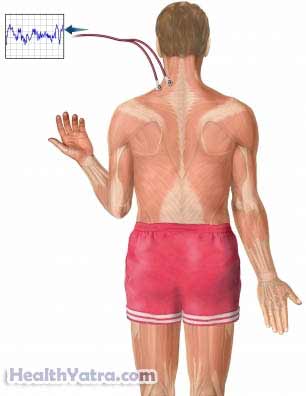Definition
Duchenne muscular dystrophy (DMD) is a genetic disease. It occurs mostly in boys. Symptoms typically appear between ages 1-4 years old. The main sign of DMD is muscle weakness that worsens over time. Before age five, the muscles in the legs, arms, and trunk begin to weaken. Later in the disease the heart and respiratory muscles weaken.
This is a progressive, serious condition that requires care from your child’s doctor. If you suspect your child has this condition, contact the doctor promptly. There are many therapies used to treat the symptoms of this disease. They should be started as soon as possible.
Causes
DMD is caused by a genetic mutation. The mutation causes the gene to make inadequate amounts of a protein called dystrophin. This protein is needed to keep muscles intact.
Risk Factors
These factors increase your child’s chance of having DMD. Tell your doctor if your child has any of these risk factors:
- Family history
- Male
Symptoms
If your child has any of these symptoms do not assume it is due to DMD. These may be caused by other conditions. Tell your doctor if your child has any of these:
- Child is late in learning to walk
- Larger than normal calf muscles
- Frequent falls
- Walks clumsily
- Difficulty climbing stairs
- Trouble running
- Walking on toes or balls of feet
- Trouble with balance
- Walks with shoulders back and belly out
- Doesn’t run
- Trouble keeping up with friends when playing
- Uses hands to climb up his body when getting up from floor (Gower’s maneuver)
- Later in the disease these symptoms can occur:
- Muscle contractures (a shortening of the muscle that traps a joint in a contracted position)
- Scoliosis
- Weakness to respiratory muscles
- Cardiomyopathy (weakness of heart muscle)
- Learning disabilities

Diagnosis
Your doctor will ask about your child’s symptoms and medical history. A physical exam will be done. Your doctor will also ask if there is any family history of neuromuscular disease. The exam will focus on your child’s muscles. The doctor will look for signs of weakness. You will likely be referred to a specialist.
Tests may include the following:
- Muscle biopsy —test that removes a small piece of muscle for examination; used to detect abnormalities in the muscle
- CK levels in blood—blood test used to measure creatine kinase, an enzyme found in damaged muscle
- Genetic testing—blood test that identifies genetic mutation of DMD
- Electromyography (EMG)—test that measures how well the nerves and muscles work; used to detect muscle problems

Treatment
Talk with your doctor about the best plan for your child. The disease worsens over time. Your child may need different treatments as the disease progresses. Options include the following:
Physical Therapy
Therapy plays a large role in treating DMD. Your child will work with a therapist to try to keep muscles strong.
The disease causes contractures. This is when a muscle shortens, making it difficult to move. The therapist will focus on preventing this with range of motion exercises.
Scoliosis is common in DMD. Exercises can help to keep the back as straight as possible.
Assistive Devices
Braces are used to keep the legs straight and prevent contractures. A walker and wheelchair may be needed later when the leg muscles become too weak to walk.
Medications
Your doctor may prescribe a steroid medication like prednisone . This can help to improve muscle strength and slow muscle weakening. Steroids can weaken bones. To keep bones healthy, your child will take vitamin D and calcium supplements. If your child experiences heart problems, he may be given certain medications to slow the damage.
Respiratory Therapy
As the disease progresses, the muscles that support breathing may weaken. Your child may need a ventilator. It will deliver air through a mask, tube, or sometimes through a tracheotomy (a surgical hole in the windpipe).
Surgery
Surgery is sometimes used to treat symptoms of DMD. For severe contractures, surgery may be performed to release specific tendons. Scoliosis can sometimes interfere with your child’s breathing. In this case, back surgery may be done.
Prevention
There are no known guidelines to prevent this progressive muscle disease.
Keywords :
Duchenne Muscular Dystrophy Definition, Duchenne Muscular Dystrophy Causes, Duchenne Muscular Dystrophy Symptoms, Duchenne Muscular Dystrophy Complications, Duchenne Muscular Dystrophy Surgery Cost in India, Duchenne Muscular Dystrophy Treatment Hospital in India, Duchenne Muscular Dystrophy Treatment in India, Duchenne Muscular Dystrophy Doctors in India, Duchenne Muscular Dystrophy Meaning in Hindi, Duchenne Muscular Dystrophy Meaning in Bengali, Duchenne Muscular Dystrophy Meaning in Arabic, Duchenne Muscular Dystrophy Treatment cost in 2024, Duchenne Muscular Dystrophy Hospital in India, Duchenne Muscular Dystrophy Treatment Near Me, best hospital for muscular dystrophy treatment in india, muscular dystrophy treatment cost in india, gene therapy for dmd in india, limb girdle muscular dystrophy treatment in india, muscular dystrophy treatment in aiims delhi, duchenne muscular dystrophy treatment cost in india, cost of stem cell therapy for muscular dystrophy in india, successful treatment of muscular dystrophy in india in hindi
